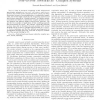1662 search results - page 29 / 333 » The Computational Complexity of Agent Design Problems |
ESAW
2004
Springer
14 years 28 days ago
2004
Springer
In this paper we present analysis and calibration techniques that exploit knowledge about a multi agent society in order to calibrate the system parameters of a corresponding socie...
SAC
2002
ACM
13 years 7 months ago
2002
ACM
Designing realistic multi-agent systems is a complex process, which involves specifying not only the functionality of individual agents, but also the authority relationships and l...
CCGRID
2003
IEEE
14 years 25 days ago
2003
IEEE
— Due to enormous complexity of the unstructured peer-to-peer networks as large-scale, self-configure, and dynamic systems, the models used to characterize these systems are eit...
DAGSTUHL
2007
13 years 9 months ago
2007
Computational social choice is an interdisciplinary
eld of study at the interface of social choice theory and computer science, with knowledge
owing in either direction. On the o...
AP2PC
2004
Springer
14 years 28 days ago
2004
Springer
Abstract. Peer-to-peer (P2P) architectures exhibit attractive properties for a wide range of real world systems. As a result they are increasingly being applied in the design of ap...

